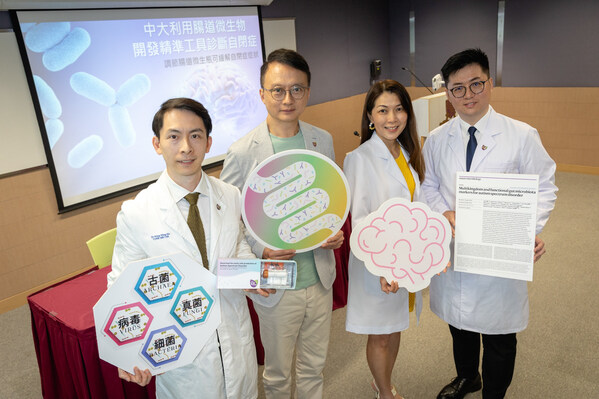CUHK identifies novel gut microbiome biomarkers to facilitate diagnosis of autism spectrum disorders
Thu, 11 Jul 2024 20:55:00 +0800
Pilot clinical study shows modulation of gut microbiome alleviates anxiety symptoms
HONG KONG, July 11, 2024 /PRNewswire/ -- The Chinese University of Hong Kong (CUHK)'s Faculty of Medicine (CU Medicine) has conducted a large cohort study among 1,627 children with and without autism spectrum disorder (ASD) and found alterations in four kingdoms of the gut microbial species in children with ASD. Using machine learning, they developed a panel of 31 multikingdom and functional markers that showed high diagnostic performance for ASD and has great potential as a clinical diagnostic tool. The findings were published in Nature Microbiology. In a pilot study, the researchers also found that modulation of the gut microbiome helped alleviate symptoms of anxiety in children with ASD, introducing the possibility of a new therapeutic paradigm for the condition.

CU Medicine research team has developed a panel of 31 multikingdom and functional markers to facilitate diagnosis of autism spectrum disorder (ASD). In a pilot clinical study, the researchers also showed that modulation of the gut microbiome alleviated symptoms of anxiety in children with ASD, introducing the possibility of a new therapeutic paradigm for the condition. (From left) Dr Oscar Wong Wing-ho, Professor Francis KL Chan, Professor Siew Ng and Dr Su Qi.
Multikingdom gut microbial markers facilitate ASD diagnosis
ASD is a neurodevelopmental condition characterised by impairment in social communication, and restrictive and repetitive behaviour. Genetic and environmental factors contribute to the pathogenesis of ASD but emerging evidence suggests that impaired cross-talk between gut microbiome and central nervous system, dubbed the gut-brain axis, may contribute to the development of ASD.
The CU Medicine researchers performed metagenomic sequencing on faecal samples from 1,627 children with or without ASD, aged one to 13 years old. The team analysed faecal samples and clinical data including diet, medication and co-morbidities, and identified a panel of novel gut microbiome markers including 14 archaea, 51 bacteria, seven fungi, 18 viruses, 27 microbial genes and 12 metabolic pathways that were altered in children with ASD. Using machine learning approaches, they then developed a novel, non-invasive diagnostic model based on a panel of 31 multikingdom and functional markers that showed a high diagnostic accuracy for ASD.
Dr Su Qi, Research Assistant Professor in the Department of Medicine and Therapeutics, said, "Our study found that the 31-microbiome panel has a sensitivity of 94% and specificity of 93% for the diagnosis of ASD, and maintained a sensitivity of 91% in children from an independent hospital cohort and a younger community cohort from 1-6 years old."
Professor Siew Ng, Croucher Professor in Medical Sciences, Director of the Microbiota I-Center (MagIC), and New Cornerstone Investigator added, "The diagnosis of ASD is challenging and requires regular developmental assessment in children who show signs of atypical social and language development. Diagnosis is often delayed especially in younger children who may only have mild symptoms and this could lead to delayed intervention. This, to our knowledge, is the first study to demonstrate the robustness and utility of a non-invasive biomarker to diagnose and predict ASD across different ages, gender and settings."
Modulation of gut microbiome alleviates sensory hypersensitivity and anxiety symptoms in ASD
The CU Medicine research team has recently completed a pilot clinical study to investigate the use of a gut microbiome modulator that aims to boost the abundance of γ-Aminobutyric acid (GABA) in children with ASD. GABA is a neurotransmitter that, when depleted, can be associated with sensory hypersensitivity and anxiety. 30 children aged 4- 11 years old with ASD were recruited to receive the novel synbiotic formula SCM06 for 12 weeks.
Dr Oscar Wong Wing-ho, Assistant Professor in the Department of Psychiatry, said "Preliminary findings indicated that children with ASD who received the synbiotic intervention SCM06 showed an overall 15-20% reduction of their sensory and anxiety symptoms. There were no serious adverse events. Given that there are limited therapeutics for ASD and some of the drugs have side effects, our results are encouraging and suggest that modulation of the gut microbiome represents a new and safe approach to ASD. We will conduct a larger randomised controlled study to confirm these findings."
Professor Francis KL Chan, Choh-Ming Li Professor of Medicine and Therapeutics and co-Director of MagIC, concluded, "Our studies demonstrated that faecal microbiome biomarkers can serve as promising noninvasive diagnostic and prediction tools for ASD, and that modulation of the gut microbiome has a great potential to become a new treatment modality for ASD. This therapeutic approach offers hope to help parents manage their children's mood problems."

 Homepage
Homepage